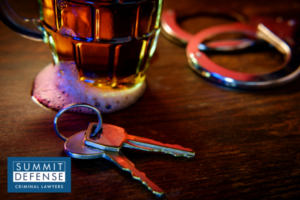 Getting arrested for a DUI can feel overwhelming. Many people worry about going to jail, paying large fines, or losing their driver’s license. But probation is another serious consequence that can affect your daily life. If you’re convicted, a judge might order probation instead of jail time, or even in addition to it. While probation may sound better than incarceration, it still includes strict rules, regular check-ins, and harsh penalties if you slip up.
Getting arrested for a DUI can feel overwhelming. Many people worry about going to jail, paying large fines, or losing their driver’s license. But probation is another serious consequence that can affect your daily life. If you’re convicted, a judge might order probation instead of jail time, or even in addition to it. While probation may sound better than incarceration, it still includes strict rules, regular check-ins, and harsh penalties if you slip up.
Summit Defense Criminal Lawyers understands how stressful it is to deal with a DUI charge. Our attorneys fight hard to protect your future. We work to get charges reduced or dismissed, and in some cases, we can help you avoid probation entirely.
If probation can’t be avoided, we push for terms that are fair and manageable. The sooner we get involved, the more options you may have. Let us help you make the best of a difficult situation.
What Is DUI Probation?
 DUI probation is a court-ordered sentence that allows someone convicted of a DUI charge to remain out of jail, as long as they follow certain rules set by the court. This is often seen in state courts, especially for first-time offenders, and can last anywhere from three to five years depending on the case.
DUI probation is a court-ordered sentence that allows someone convicted of a DUI charge to remain out of jail, as long as they follow certain rules set by the court. This is often seen in state courts, especially for first-time offenders, and can last anywhere from three to five years depending on the case.
During this time, the person must obey specific conditions, such as avoiding alcohol, not committing another crime, completing community service, attending DUI classes, and regularly checking in with a probation officer.
Even though you may not be serving time behind bars, probation violations can still lead to very serious consequences. If you are caught drinking, miss meetings, or break any rule, the judge can send you straight to jail. This is why having an experienced DUI lawyer is important, they can argue for better terms or possibly even help you avoid probation altogether if there is reasonable doubt about the DUI arrest.
How Long DUI Probation Typically Lasts
 The length of DUI probation depends on the details of the DUI case, but in most state courts, it often lasts for three to five years, especially for first-time offenders who did not cause injury or property damage. During this time, the court expects the person to follow all the rules closely, which may include staying sober, submitting to breath or blood tests when asked, and checking in with their probation officer regularly.
The length of DUI probation depends on the details of the DUI case, but in most state courts, it often lasts for three to five years, especially for first-time offenders who did not cause injury or property damage. During this time, the court expects the person to follow all the rules closely, which may include staying sober, submitting to breath or blood tests when asked, and checking in with their probation officer regularly.
If someone has a past DUI conviction or there are aggravating factors like having a high blood alcohol level, causing an accident, or having a child in the car, the court may extend the probation period or make the terms stricter. The longer the probation, the more chances there are to accidentally commit a probation violation, which is why strong legal representation is important from the start.
Consequences of Violating DUI Probation
- Jail time – The judge can send you to jail for breaking any term of your DUI probation, even for a minor issue.
- Extended probation – The court might add more time to your probation instead of sending you to jail.
- Community service – You may be ordered to perform community service hours if found in probation violation.
- Fines – A probation violation can lead to additional fines depending on the circumstances of the case.
- Mandatory programs – You could be forced to attend alcohol education, DUI school, or treatment classes.
- House arrest – In some cases, the court may order house arrest with monitoring instead of jail.
When Is Probation Usually Ordered in DUI Cases?
Probation is often used instead of jail time, especially in first-offense cases. It gives the court a way to monitor someone without placing them behind bars.
is often used instead of jail time, especially in first-offense cases. It gives the court a way to monitor someone without placing them behind bars.
First-Time vs. Repeat Offenders
If it’s your first DUI arrest, the judge may decide to issue probation instead of incarceration, especially if there was no crash or injury. You might still face fines, alcohol classes, and other rules, but you’ll likely avoid serving time.
If you have prior DUI convictions, the chances of getting probation drop. Repeat offenders often get harsher sentences, which may include jail and stricter rules if probation is granted at all.
Aggravating Factors (Accidents, High BAC, Minors in Car)
If there was a crash, a blood alcohol level far above the legal limit, or a child passenger, the court sees the offense as more serious. These aggravating factors often lead to tougher punishment, like house arrest or even full incarceration, even on a first offense.
These situations also reduce your chance of avoiding probation unless your defense attorney presents a strong case.
Plea Bargains That Include Probation
A plea bargain is often used to settle the case without going to trial. In many DUI cases, the prosecutors agree to a lesser sentence in exchange for a guilty plea. Probation is commonly included in these deals.
A skilled attorney can often negotiate for terms that help you avoid jail time, or at least reduce how long you serve probation.
How a DUI Lawyer Can Help Reduce or Avoid Probation
A good defense strategy starts with knowing what’s possible. In some cases, a lawyer may help you avoid probation completely.
Challenging the DUI Charges
An experienced DUI lawyer will first look at the strength of the prosecution’s case. If the officer did not follow proper procedures, or the breath or blood test was not properly calibrated, the lawyer may be able to challenge the entire DUI charge. If they create reasonable doubt, the charges could be dropped.
Negotiating for Lesser Penalties
Sometimes, avoiding probation is not about proving innocence but about getting a better deal. Your lawyer may use the facts of the DUI case to convince the court to issue fines or community service instead of probation.
This often works best when the person arrested has no prior conviction or shows positive steps after the DUI arrest.
Identifying Legal or Procedural Errors
Every DUI arrest must follow the law. If the arresting officer made a mistake or lacked reasonable suspicion, your attorney can bring it up in court. If the court agrees, the DUI charge may be reduced or dismissed. This can help you avoid probation violation risks later.
FAQs


 If you're worried about DUI probation, don't wait.
If you're worried about DUI probation, don't wait. 